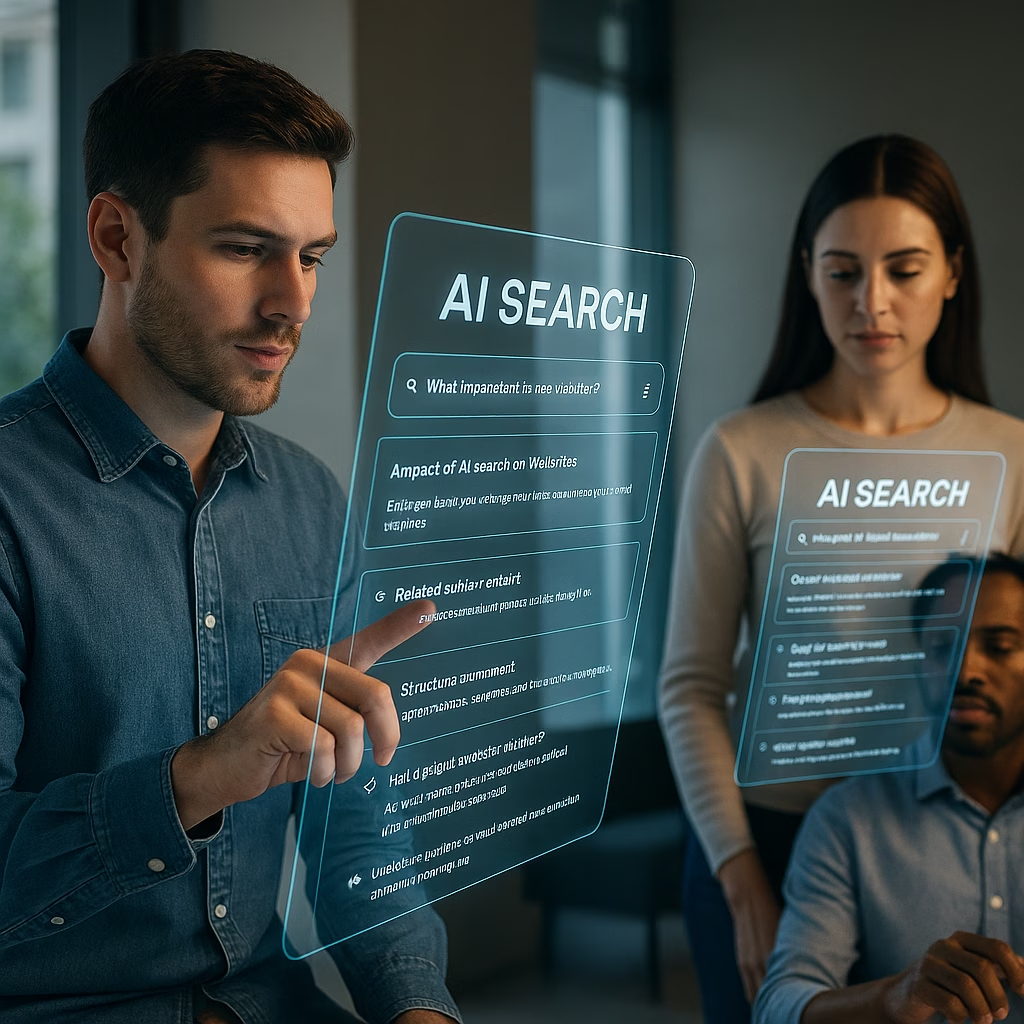
What if no one visits your website anymore?
With the rise of AI search technology like ChatGPT, Perplexity, and Google’s AI Overviews, the way people find information online is fundamentally changing. Traditional search engines display a list of links. AI search engines provide the answer directly. This has major implications for creating, maintaining, and positioning websites.
The classic website is built around navigation, SEO, and conversion: a homepage, landing pages, call-to-actions. But AI searchers skip all that. They retrieve information directly from your content, often without a visitor ever coming to your site. The website as an intermediate station disappears. What remains is the underlying content – texts, documents, insights – that is picked up and processed by AI.
❓What does this mean for your website?
-
Structure less important, content more important than ever
Navigation structures, menu buttons, and page layouts are irrelevant to AI. What matters: well-written, substantively strong, and clear text. -
SEO changes radically
Keywords still count, but AI models also look at context, authority, and consistency. Keys to success are source citation, timeliness, and reliability. -
Visitors are not always your end goal
Your content can have influence without your website being visited. AIs use your site as a data source, and your reputation is indirectly built through the answers of others.
🛠️ How to keep websites relevant?
AI search does not mean the end of websites, but the end of the website as a goal in itself. The website becomes an infrastructure layer. Compare it to electricity: invisible, but essential. A number of strategic choices:
-
Invest in authoritative content
Articles, whitepapers, documentation – anything that helps AI understand what you are about. -
Use structured data (schema.org)
AI prefers to read structured information over beautiful HTML. Make it easy for them. -
Provide content that AIs want to cite
Think: clear language, up-to-date sources, unique expertise, concise summaries. -
Keep your content alive
AI models learn from current and popular content. Regular updates and signals like backlinks and social shares help.
We have developed a plugin that can help by providing it to an AI in a structured way in multiple languages. And it’s free too.
🌐What remains valuable about a website?
-
Trust and conversion
When people do come to your site, it should feel good. Professional, secure, clear. -
In-depth interaction
AI provides answers, but your site can show who you are: with cases, contact options, products, or demonstrations. -
Your own channel
On social media and in AI chats, you are a guest. On your website, you are the host. You want to maintain that control.
✅ Key insights
-
AI search engines display direct answers, not link lists. However, they do include snippets with references.
-
Content is more important than web design or navigation
-
Structured data and up-to-date information increase AI usability
-
Websites remain valuable as a reliable source and conversion point
❓ Frequently asked questions
What is the difference between traditional SEO and AI Search optimization?
Traditional SEO focuses on keyword placement and backlinks. AI Search primarily looks at content value, structure, and reliability.
Do I need to rebuild my entire site?
No, start by improving content on existing pages. Add structured data and update regularly.
How do I know if my content is being used by AI?
Check if your site is cited in AI results (like Perplexity.ai) and monitor analytics. You can also use tools like GPTBot tracker or server logs.
🧭 Conclusion: Build your content, not just your site
AI search requires a new perspective on digital presence. A website is no longer a brochure, but a data source, a knowledge center, and a bridge to AI systems. Think less in terms of “pages” and more in terms of “content units”. Ensure your expertise is findable, readable, and usable – by people and by AI.
🤝 Do you need help adapting your website for the AI search world? NetCare helps you strategically and technically. Also, be sure to check out OpenAI’s tips on web crawlers